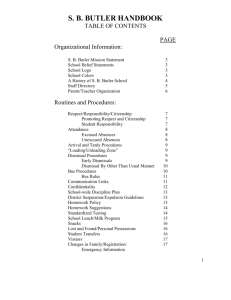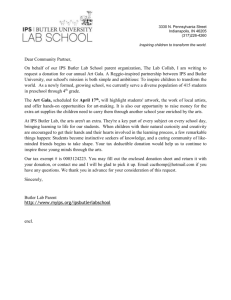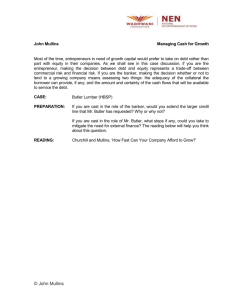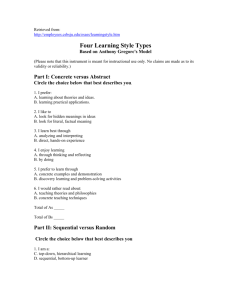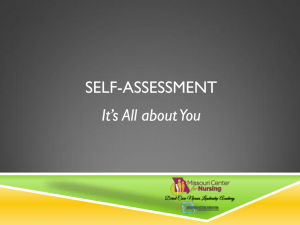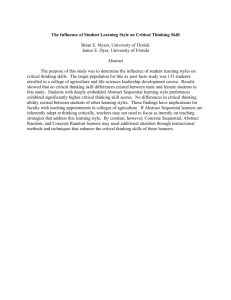Your Learning Style
advertisement
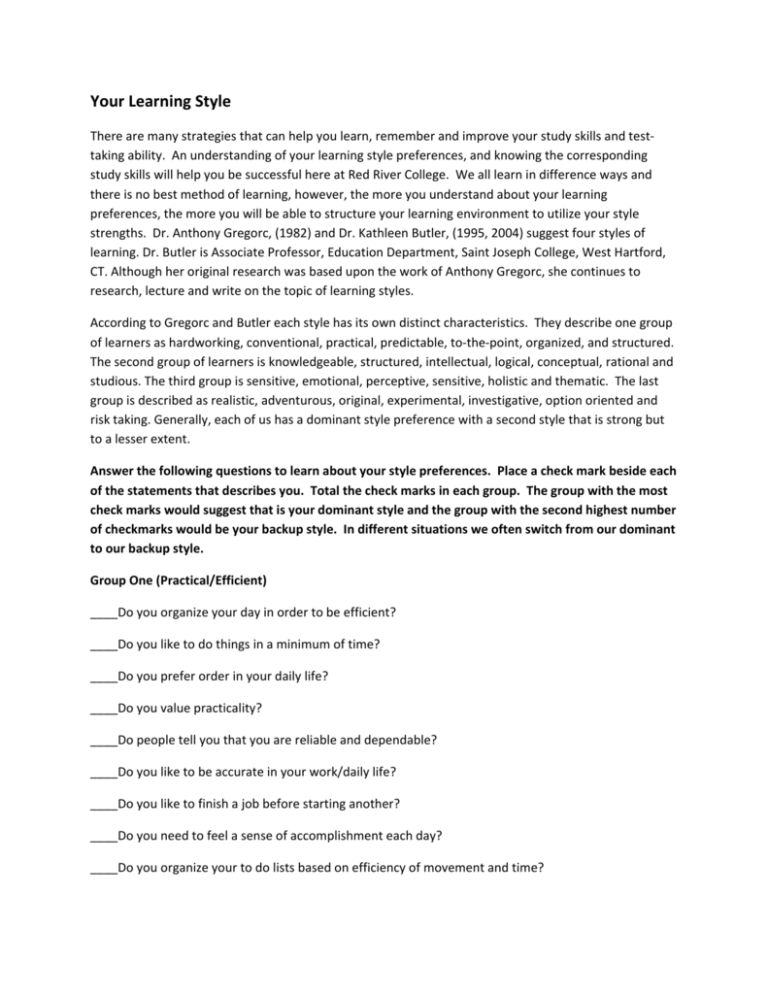
Your Learning Style There are many strategies that can help you learn, remember and improve your study skills and test‐ taking ability. An understanding of your learning style preferences, and knowing the corresponding study skills will help you be successful here at Red River College. We all learn in difference ways and there is no best method of learning, however, the more you understand about your learning preferences, the more you will be able to structure your learning environment to utilize your style strengths. Dr. Anthony Gregorc, (1982) and Dr. Kathleen Butler, (1995, 2004) suggest four styles of learning. Dr. Butler is Associate Professor, Education Department, Saint Joseph College, West Hartford, CT. Although her original research was based upon the work of Anthony Gregorc, she continues to research, lecture and write on the topic of learning styles. According to Gregorc and Butler each style has its own distinct characteristics. They describe one group of learners as hardworking, conventional, practical, predictable, to‐the‐point, organized, and structured. The second group of learners is knowledgeable, structured, intellectual, logical, conceptual, rational and studious. The third group is sensitive, emotional, perceptive, sensitive, holistic and thematic. The last group is described as realistic, adventurous, original, experimental, investigative, option oriented and risk taking. Generally, each of us has a dominant style preference with a second style that is strong but to a lesser extent. Answer the following questions to learn about your style preferences. Place a check mark beside each of the statements that describes you. Total the check marks in each group. The group with the most check marks would suggest that is your dominant style and the group with the second highest number of checkmarks would be your backup style. In different situations we often switch from our dominant to our backup style. Group One (Practical/Efficient) ____Do you organize your day in order to be efficient? ____Do you like to do things in a minimum of time? ____Do you prefer order in your daily life? ____Do you value practicality? ____Do people tell you that you are reliable and dependable? ____Do you like to be accurate in your work/daily life? ____Do you like to finish a job before starting another? ____Do you need to feel a sense of accomplishment each day? ____Do you organize your to do lists based on efficiency of movement and time? ____Do you seek and want directions when starting an assignment? Group Two (Studious) ____Do you enjoy debates? ____Do you usually win the debate or argument? ____Do you like to read and do so often? ____Do you feel a need to search for knowledge and continually learn about new information? ____Do you like documentaries? ____Do you enjoy spending time in bookstores and libraries? ____Do you enjoy researching new ideas, analysizing and evaluating those ideas? ____ Do you prefer to read nonfiction books? ____Do you like to write down your ideas in a structured fashion? ____Do you often win a trivial pursuit? Group Three (Personable/Creative) ____Do you like to like to work with others to accomplish a task? ____Do you like the arts, music and poetry? ____Do you need a visually pleasing environment/work space? ____Do people hold more importance to you than things? ____Do you consider yourself a good judge of character? ____Do you avoid competition? ____Do you easily sense a friend’s feelings? ____Do you have like to be flexible? ____Do you have difficulty remembering directions? ____Do you prefer to see the big picture rather than the details? Group Four (Experimenter/Instigator) ____Do you like to solve problems? ____Do you prefer complex problems than are not easily solved and a challenge? ____Do you like to try to put something together before reading the instructions? ____Do you like change and get bored easily? ____Do you often have different ideas than those around you? ____Do you like to try new things? ____Do you like organized chaos? ____Do you see many options when face with a problem to solve? ____Do you consider yourself a risk‐taker when trying new things? ____Do you often start new projects before completing the last one and have several in a partial state of completion? Now that you know something about your learning strengths, in the next section we will look at how you can use this knowledge to enhance your study skills. Although you will find a number of suggestions ‐ no one approach will work for one style all the time. Examine the suggestions and see what best fits your preferences. Group One (Practical/Efficient) Study Skills 1) Set up a quiet study environment; 2) Be sure of the task and what is expected; 3) Record all assignments in one place preferable a book and refer to it before beginning the assignment; 4) Ask your instructor for an example; 5) Double check the directions; 6) Organize your time; 7) If not sure of the specific purpose ask for assignment clarification; 8) Talk with your study buddy to clarify details; and 9) Review your notes at the end of each day and fill in any missing details. Group Two (Studious) Study Skills 1) 2) 3) 4) 5) Highlight important concepts in both your text and in your notes; Write key concepts in the margins of your notebook; Ask “why” questions; Make an outline of points you will discuss in your paper or essay; When gathering information on a topic allocate your time and don’t spend too much time gathering information and not allow enough time for the actual writing; and 6) When studying spend equal amounts of time on all aspects of the material. Group Three (Personal/Creative) Study Skills 1) 2) 3) 4) 5) 6) 7) 8) Color code a calendar with important information such as test dates, and assignment due dates; Use different color highlighters to indicate concepts, details and questions/answers; Talk with your study buddy and fill in missing points in a different color pen so they stand out; Set up a visually and esthetically comfortable learning/studying environment; Remember details by using visual and verbal association techniques; Use color coded flashcards to reinforce important concepts; Use post‐it notes to remind you of important details; Pay attention to details and use materials such as a dictionary, APA guidelines, and a thesaurus; and 9) Study with a partner but remain focused on the task at hand. Group Four (Experimenter/Instigator) Study Skills 1) 2) 3) 4) 5) Ask for direction regarding deadlines; Organize your time so you complete the assignment on time; Complete all projects and assignments completely before starting a new one; If given a choice select problem/challenging projects rather than research assignments; When given an assignment write down as many ideas about the topic do an individual brainstorm before starting the project; 6) Organize your thoughts when writing as essay – develop an outline; and 7) Create additional ideas and possible solutions rather than judge those presented by your instructor. References Butler, K.A. (1986). Learning and Teaching Style: In Theory and Practice. Columbia, CT: The Learner’s Dimension. Butler, K.A. (1995). Learning Styles: Personal Exploration and Practical Applications – An inquiry Guide for Students. Columbia, CT: The Learner’s Dimension. Butler, K.A. (2004). Perspectives on Learning. Teachers College Record, 1592‐1593. Butler, K.A. (2005). Assessing Beautiful Minds. WAMLE (Wisconsin Association of Middle Level Educators) Journal. Conner, M. L. (2007). Ageless Learner. http://agelesslearner.com/intros/lstyleintro.html. Retrived 7/12/2010. Gregorc, Anthony F. (1982). An Adult’s Guide to Style. Columbia, CT: Gregorc Associates.
